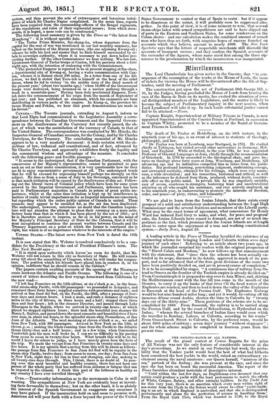311tsrrllaunuto.
The Lord Chamberlain has given notice in the Gazette, that "in con- sequence of the resumption of the works at the House of Lords, the issue of tickets for viewing the House will be discontinued after the 6th of Sep- tember, until the meeting of Parliament."
The construction put upon the act of Parliament 69th George III. c. 31, by the Judges, having precluded the House of Lords from hearing the case of the Baron de Bode on its merits, has excited the attention of seve- ral distinguished members of the Legislature, and the matter is likely to become the subject of Parliamentary inquiry in the next session, when Lord Lyndhurst will take it up. In such hands substantial justice cannot fail to be attained.—Times.
Captain Knight, Superintendent of Military Prisons in Canada, is now appointed Superintendent of the Convict Prison at Portland, in succession to Captain Whitty, promoted to be a member of the Board of Govern- ment Prisons in London.
The death of Dr. Paulus at Heidelberg, on the 10th instant, in the ninetieth year of his age, is an event of interest to students of theology, philosophy, and law.
" Dr. Paulus was born at 'Leonburg, near Stuttgard, in 1761. He studied chiefly at Tubingen, but visited several other universities in Germany, Hol- land, and England. While at Oxford, in the year 1784, he was appointed Professor of Oriental Languages at Jena, chiefly through the recommendation of Griesbach. In 1793 he succeeded to the theological chair, and gave lec- tures on theology above forty years at Jena, Wurzburg, and Heidelberg, till advancing age and its infirmities compelled him to retire from his public duties. His profound learning, penetrating judgment, unshrinking courage, and unwearied assiduity, obtained for his writings, which were very nume- rous, a wide circulation ; and his researches, historical and critical, as well as the inferences he deduced from them, produced, without doubt, consider- able effect on the public mind. In private life he was singularly amiable, easy of access, courteous to strangers, bestowing kind and unostentatious attention on all who sought his assistance, and ever actively employed, up to his ninetieth year, in endeavouring to promote the interests of freedom, order, and peace—of piety, virtue, and humanity."
We are glad to learn from the Ionian Islands, that there exists every prospect of a solid and satisfactory understanding between the Logd High Commissioner and the several fractions and members of the Liberal party. What may be the exact terms of agreement, what concessions Sir Henry Ward has induced Earl Grey to make, and what, for peace and progress' sake, the Ionian Liberals have ceased to demand, are not of so much im- portance as the fact, which promises that the Ionian Islands are at length about to enter upon the enjoyment of a true and working constitutional system.—Daily News, August 25.
A leading article in the Times of Thursday heralded the existence of an engineering scheme for bringing London and Calcutta within seven days' journey of each other Referring to an article about two years ago, in which the journalist surprised his readers with the original prospectus of the "Direct Calais and Mooltan," he now follows up that announcement with the statement, that " since then the scheme has been actually ex- tended in its scope, discussed in its details, approved in much of its pur- port, and so far advanced that of the four great divisions of the route two have been positively decided on, and are in present course of completion." It is to be accomplished by stages. " A continuous line of railway from Os- tend to Orsova on the frontier of the Turkish empire is already decided on." From Constantinople it is proposed to step over to Asia Minor, and, skirting the Mediterranean coast with the line till you come to the mouth of the Orontes, to carry it up the banks of that river till the head waters of the Euphrates are reached, and then to lead it down the valley of the Euphrates to Bussorah at the head of the Persian Gulf. The Euphrates Railway would be but nine hundred miles long ; and yet it would, by cutting off the immense detour round Arabia, shorten the time to Calcutta by " twenty days out of the thirty-nine." These portions of the scheme are to be ac- complished by 1860. From Bussorah, the railway is to be carried along the Persian Gulf, and by the coast of Beloochistan, to Hyderabad on the Indus ; " whence the several branches of Indian lines would soon whisk the traveller to Bombay, Lahore, or Calcutta, according to his wants." From Gracechurch Street to Calcutta, by the perfected route, would be about 5600 miles of railway ; seven days' journey " without stoppages" ; and the whole scheme might be completed in fourteen years from the present time.


























 Previous page
Previous page